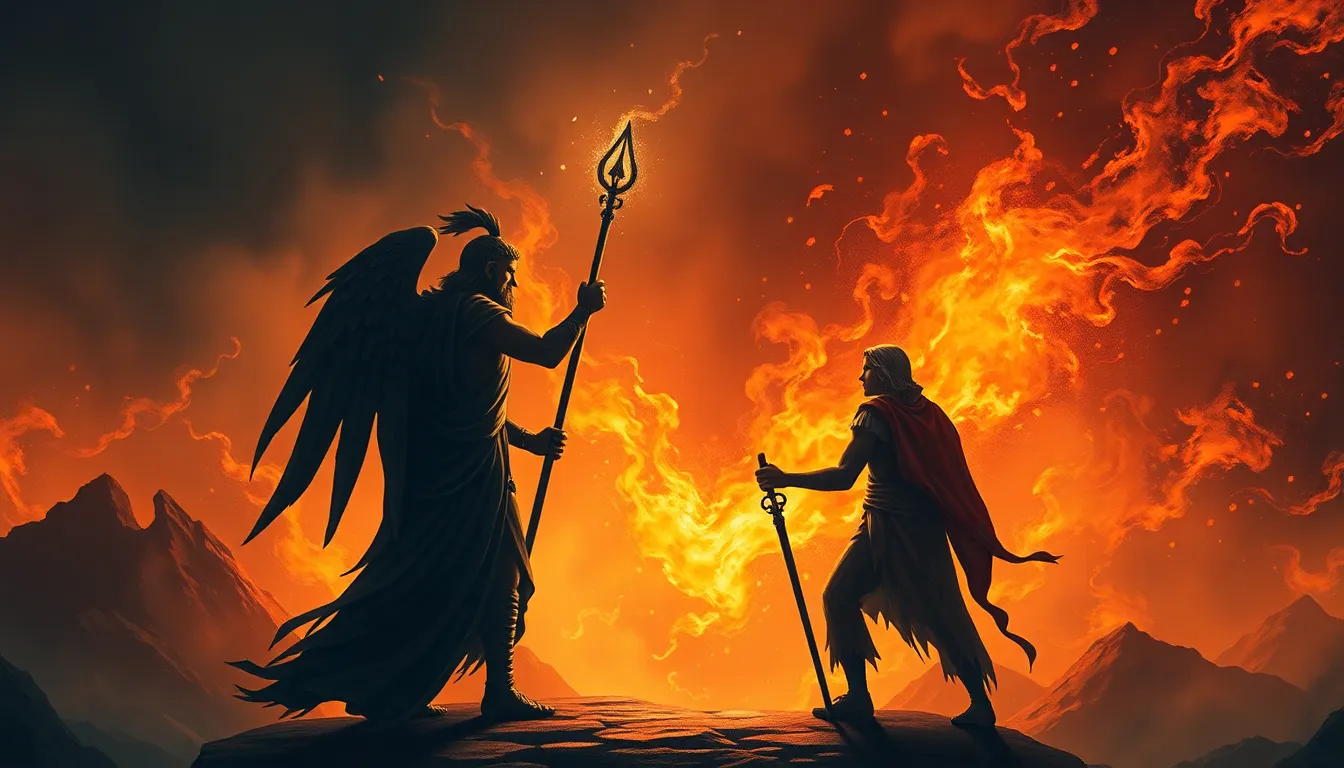The Mountain of the Timeless: Legends of Eternal Existence
I. Introduction
The “Mountain of the Timeless” serves as a powerful symbol in many cultures, representing a place where time stands still and eternal existence is achievable. It embodies the human fascination with immortality and the quest for meaning beyond the temporal realm. Throughout history, various cultures have envisioned mountains as gateways to the divine or as residences of gods, emphasizing their significance in the exploration of eternal existence.
This article aims to delve into the legends surrounding the Mountain of the Timeless, examining their cultural implications and the philosophical questions they raise about life, death, and the nature of existence itself.
II. Historical Context of the Mountain Myth
Mountains have held a sacred place in the hearts of ancient civilizations. From the towering peaks of the Himalayas to the revered heights of Mount Olympus, these natural formations have been associated with eternity and the divine.
- Ancient Civilizations and Their Mountains of Eternity: Cultures such as the Greeks, Hindus, and Native Americans have worshipped mountains as sacred sites, believing they are the abodes of gods or spirits.
- Archaeological Findings Related to Mountain Worship: Excavations have uncovered altars, temples, and relics that indicate the significance of mountains in religious practices.
- Evolution of the Myth Across Different Cultures and Eras: As societies evolved, so did their interpretations of these mountains, reflecting changes in philosophical and spiritual beliefs.
III. The Symbolism of Mountains in Mythology
Mountains often symbolize more than just physical elevation; they represent spiritual ascension, enlightenment, and the connection between humanity and the divine.
- Mountains as Sacred Spaces in Various Religions: In many traditions, mountains are seen as places where heaven and earth meet, making them ideal for spiritual experiences.
- The Connection Between Mountains and the Divine: The sheer majesty of mountains evokes awe and reverence, often leading to the belief that they are closer to the gods.
- Common Themes Found in Mountain Myths: Many myths involve themes of ascent, trials, and the pursuit of enlightenment, reflecting the challenges and rewards of spiritual journeys.
IV. Key Legends Surrounding the Mountain of the Timeless
Across cultures, the Mountain of the Timeless is woven into numerous legends that highlight its significance in human consciousness.
- Overview of Major Legends from Different Cultures:
- Mount Olympus in Greek mythology, home to the gods.
- Mount Meru in Hindu and Buddhist traditions, considered the axis of the universe.
- Mount Fuji in Japan, symbolizing beauty and spirituality.
- Detailed Exploration of Specific Legends:
Mount Olympus was believed to be the dwelling place of the gods, where they governed the affairs of humanity. Meanwhile, Mount Meru is often depicted as a cosmic mountain that connects the earthly realm with the heavens, embodying the center of all reality.
- The Role of Myths in Shaping Cultural Identity: These legends not only reflect a society’s beliefs but also play a crucial role in forming cultural identity and community values.
V. The Philosophical Implications of Eternal Existence
The idea of immortality has been a central theme in human thought, inspiring countless philosophical inquiries and debates.
- The Concept of Immortality in Human Thought: Philosophers from Plato to modern existentialists have pondered the nature of existence and what it means to be eternal.
- How Legends Reflect Humanity’s Desire for Permanence: The recurring theme of mountains in myths illustrates our yearning for connection to something greater and more enduring than ourselves.
- Comparisons Between Physical and Spiritual Interpretations of Eternity: The dual nature of mountains—both as physical entities and as spiritual symbols—invites reflection on the nature of life and the afterlife.
VI. The Mountain in Literature and Art
Mountains have been a source of inspiration in literature and art, symbolizing challenges, spirituality, and the sublime.
- Representation of the Mountain in Classic Literature: Works such as “The Odyssey” and “The Divine Comedy” feature mountains as pivotal settings for journeys of transformation.
- Artistic Interpretations of Eternal Existence through Visual Art: Artists like Caspar David Friedrich captured the awe of mountains, evoking feelings of the sublime and the eternal.
- The Impact of These Representations on Modern Storytelling: Contemporary narratives often draw on these archetypes, using mountains to symbolize personal quests and spiritual awakenings.
VII. Modern Interpretations and Cultural Relevance
In contemporary society, there is a resurgence of interest in ancient myths and their relevance to modern life.
- The Resurgence of Interest in Ancient Myths: As people seek deeper meaning, the timeless lessons of these legends find new audiences.
- The Role of the Mountain in Modern Spirituality and Mindfulness: Many individuals turn to nature and mountain retreats as a way to reconnect with themselves and find peace.
- How Legends of Eternal Existence Influence Current Philosophical Discussions: These discussions challenge us to consider our own beliefs about life, death, and what it means to exist.
VIII. The Mountain of the Timeless in Popular Culture
Mountains continue to captivate the imagination in various forms of popular culture.
- Depictions in Film, Television, and Video Games: Movies and games often use mountains as metaphors for adventure, challenge, and self-discovery.
- Symbolism of the Mountain in Pop Music and Fashion: Artists incorporate mountain imagery to convey themes of aspiration and transcendence.
- Analysis of How These Portrayals Impact Societal Views on Eternity: These representations shape our collective understanding of timelessness and influence our aspirations and fears regarding life and death.
IX. Personal Reflections and Contemporary Legends
In our personal lives, we all encounter our own “mountains,” representing challenges, aspirations, and quests for meaning.
- The Notion of Personal Mountains in Individual Lives: These can symbolize personal growth, struggles, and achievements.
- Stories of Modern Seekers and Their Quests for Eternal Existence: Many individuals share their journeys towards finding lasting fulfillment and understanding their place in the universe.
- How Personal Experiences Shape Our Understanding of Timelessness: Our interactions with mountains—literal or metaphorical—often reflect our inner journeys and transformations.
X. Conclusion
The Mountain of the Timeless serves as a powerful symbol that transcends cultures and eras, representing humanity’s deep-seated desire for eternal existence. Through various legends, philosophical implications, and cultural representations, we see how mountains continue to inspire and challenge us. Whether in mythology, literature, or our personal lives, these timeless mountains remind us of the beauty and complexity of our quest for meaning and connection in an ever-changing world.




